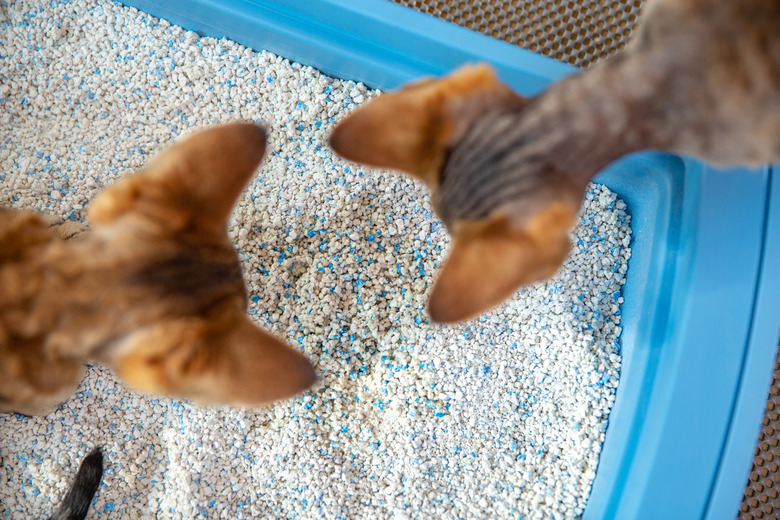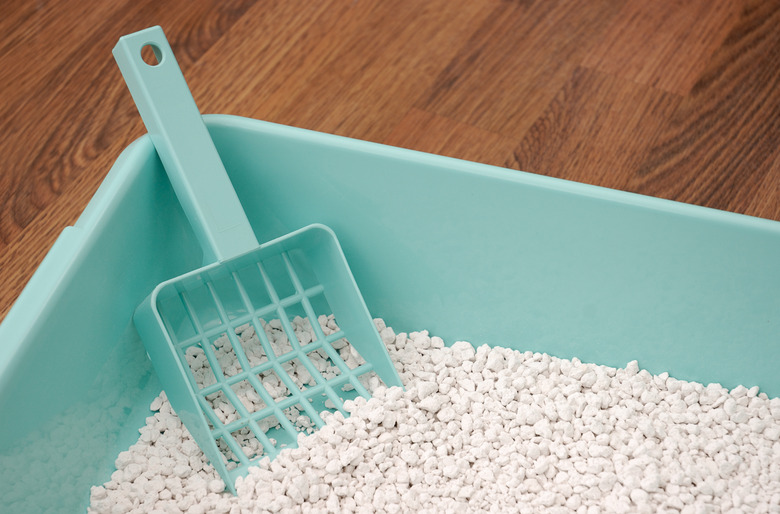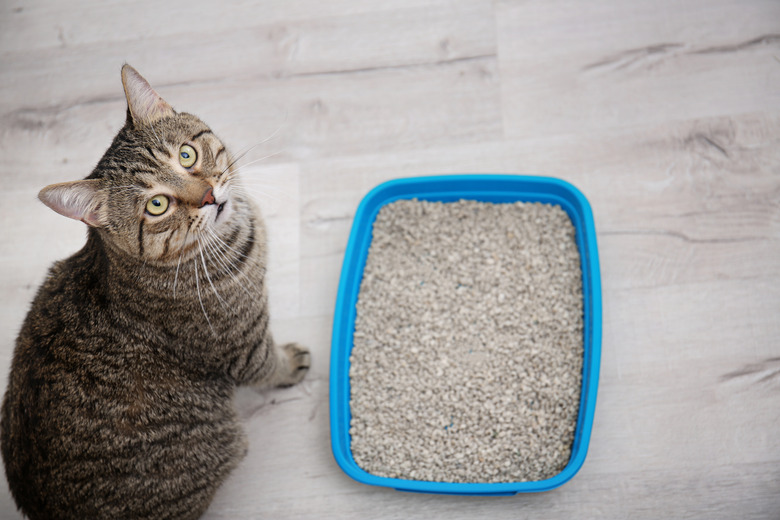How Often Should I Replace My Cat's Litter Box & Scoop?
Disclosure: At Cuteness, we are committed to being the go-to resource for pet owners and animal lovers. We only recommend products we think our audience will love. If you purchase something by clicking on one of these links, we may receive a small commission of the sale and the retailer might receive some data for accounting purposes.
Nearly 32 million American households are graced with the presence of at least one cat. Besides the natural attraction to their beauty, fascinating feline charms, and entertaining antics, cats are considered low-maintenance pets with whom we can share companionship and unconditional love.
But while you don't need to take your cat outside for long walks or do obedience training with her, she does need a nutritious diet, a stimulating environment, adequate exercise, and plenty of attention. And in keeping with their fastidious nature, cats also need a meticulously clean litter box in which to bury their waste.
Knowing not only how often to clean the litter box, but also when to replace the litter box itself and the scoop is key to preventing odor that can lead to "litter box avoidance." And depending on the number of cats in your house, that could be more frequently than you thought. You should replace your cat's litter box and litter scoop at least once per year and more often if you have multiple cats.
Replace the cat litter box annually
Replace the cat litter box annually
Litter box aesthetics, filler choices, and maintenance rank among the highest priorities for pet parents. From what style of litter box to buy to how many you need for the number of cats in your home to what kind of litter to use, discussions about litter boxes and cat behavior issues related to litter boxes are ubiquitous.
But something you don't read about every day is how often to replace the litter box and scoop. Replacing this duo is something that pet parents often overlook and it's not unusual that a litter box is used for a few or even several years. But litter boxes and scoops should be replaced at least once per year, says Dr. Debra Primovic DVM, of Pet Place.
Why replace the cat litter box and scoop?
Why replace the cat litter box and scoop?
Over time, plastic litter boxes break down. From the wear and tear of cat claws ripping its surface and the action of scooping, a litter box becomes rough and pitted yielding cracks that harbor bacteria, trap odor, and allow urine to soak in making the box smell all the time. This can discourage your cat from using the box and lends your home the unpleasant aroma of cat-box odor. Animal Planet says one of the most important reasons cats refuse to use the litter box is because it smells "bad." And who can blame them?
Also, as plastic interacts with the acid in urine, it causes chemical changes that may irritate your cat's paws and nose. Plastic degradation can make the litter box leak with urine seeping into the carpet or porous floors, and worst-case scenario, the litter box can fall apart. To help remember to replace your cat's litter box and scoop, you could schedule litter box replacements to coincide with your cat's birthday, for example. At the same time, toss your old litter scoop. As the plastic gets rough, the clean litter stops flowing smoothly through the open parts of the tool when waste is picked up causing you to lose more clean litter with dirty litter as you scoop. A rough, pitted litter box is difficult to scoop efficiently and effectively, leaving soiled residue in the box to create even more odor.
Here are a few other reasons why you should replace your cat's litter box and scoop at least once a year so your cat always has a clean, fresh-smelling litter box:
- Cats may hold in their urine and bowel movements if the box smells, which can cause significant health problems, particularly for a male cat who could develop a urinary blockage.
- Human members of the household who are seniors, babies, pregnant, or immune-compromised should never handle or clean the litter box but keeping a super-clean box in these instances is vital.
One way you can ensure the litter box is as clean as possible is to scoop a couple of times daily; empty the box once every three weeks and scrub it well with soap and water, then fill with fresh litter; and replace the litter box and scoop at least once a year for one cat and more often for a number of cats.
Finding Good Cat Litter Box Products
Finding Good Cat Litter Box Products
There are a lot of products out there, from open boxes to covered cat litter box "houses." Sometimes, the best litter box depends on your cat's personality. If you know your cat likes the security of sleeping in an enclosed bed, they may like doing their business in an enclosed litter box like this one on Chewy.com. There are some that the cats enter from the side, and some that they can learn to enter from the top, like this Iris Top Entry litter box. Plastic litter box scoops can sometimes be flimsy, and if you're using a heavy duty clumping litter, it can get heavy. A metal cat litter scoop is less likely to break at an inopportune time. If you don't have a good cabinet in which to keep your litter box supplies, getting a litter scoop with a caddy keeps things neat. As your cat ages, it may get harder to for your cat to climb into a litter box if it has tall sides. Some litter pans are specially designed for senior cats or others with mobility issues. This senior cat litter box is taller on the sides and back but lower in the front.
Conclusion
Conclusion
You should replace your cat's litter box and scoop at least once a year to prevent germs, odors, and litter-box avoidance issues.
Always check with your veterinarian before changing your pet's diet, medication, or physical activity routines. This information is not a substitute for a vet's opinion.


